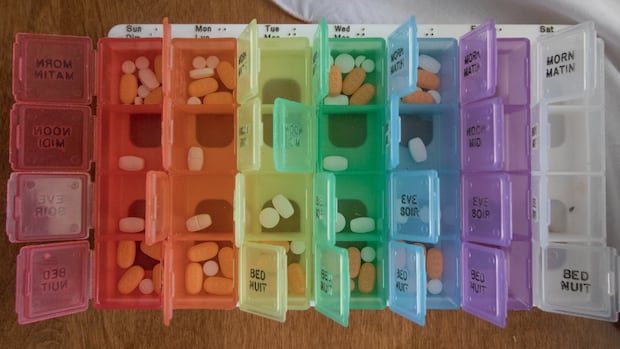A non-profit organization in Halifax supplying low-cost medication and mail-out prescriptions in Nova Scotia is cutting programs due to overwhelming demand and financial pressure.
Starting in September, the Metropolitan Dispensary will no longer accept referrals from outside the central region and will stop mailing medication altogether.
Nicholas Humphreys, a client of the dispensary, said he receives a monthly prescription in the mail. He said it was unsettling to learn the program was ending.
“Its accessibility is important for all Nova Scotians, especially [for] people with disabilities or lower-income folks who need that service,” he said.
In a letter sent to Humphreys last month, the organization’s board said they “do not have either the financial, physical, or staff capacity to meet the need for less expensive medication services arising throughout the province.”
The dispensary said the cuts are happening despite their “best efforts.”
Humphreys, 43, requires supplemental oxygen. He has experienced a number of lung issues, including two collapsed lungs due to COVID-19 that landed him in hospital.
He lives in the Halifax area but said he felt safer having his prescriptions mailed to him rather than going in person because of his health issues.
“I could come in contact with other people that may have respiratory issues,” he said. “So, having that option to have it delivered cut down on me being out in public around other people.”
Extra cost
He said the service is also essential for when he is too ill to leave his house. He says he will now have to pay for a taxi or call an access-a-bus to pick up his prescriptions.
The notice sent to Humphreys recommends sending a friend or family member to pick up medications if they can’t do so themselves.
Humphreys said he’s concerned about limiting accessibility. “If you don’t have anybody and you rely on that, to have them sent to you, I don’t think it’s fair.”
The Metropolitan Dispensary requires a referral from a social worker or 211 Nova Scotia in order to access cost-price medication and lower dispensing fees.
Other pharmacies offer delivery services, but Humphreys said the low-cost option is what drew him, and likely others, to the dispensary’s program. He said he hasn’t found an equivalent.
‘Unprecedented demand’
The Metropolitan Dispensary did not immediately respond to the CBC’s request for an interview, but said in an email it is seeing “unprecedented” demand for affordable medication. It would need up to $100,000 to continue the service, the email says.
Certain programs are paid for by the province and will not be affected by the cuts, according to the dispensary.
The non-profit fills up to 2,900 prescriptions a month and operates out of a space donated by the IWK. It is the only location in the province.
[IMAGE
]According to the dispensary, 91 letters have been sent to patients across the province thus far.
“With the increased need for more staff and higher wages needed to pay the staff … we simply do not have the physical, financial nor personnel resources to further expand our services,” Judy Collin, the director of the dispensary’s board, said in an email.
Wider problem
Lyn Stuart, a caregiver support co-ordinator for Caregivers Nova Scotia, works in Cape Breton supporting people who are looking after those in need of at-home support, including seniors. She said the pressure on health-care non-profits is a symptom of a larger failure.
“We have a health-care system that’s in crisis,” said Stuart. “We really do see these non-profit organizations … doing a really wonderful job of filling those gaps. But non-profits are, honestly, underfunded and often very much stretched thin.”
She said delivery services are essential for those who cannot easily get to a pharmacy, but affordability is also a big concern. She said this is especially true of those living in rural areas because there are often fewer pharmacy options available and they take longer to access.
“We hear that people ration their medications, they skip doses to save money. They share their medication with their spouses or their family members if they’re on the same happened to be on the same blood pressure medication.”
